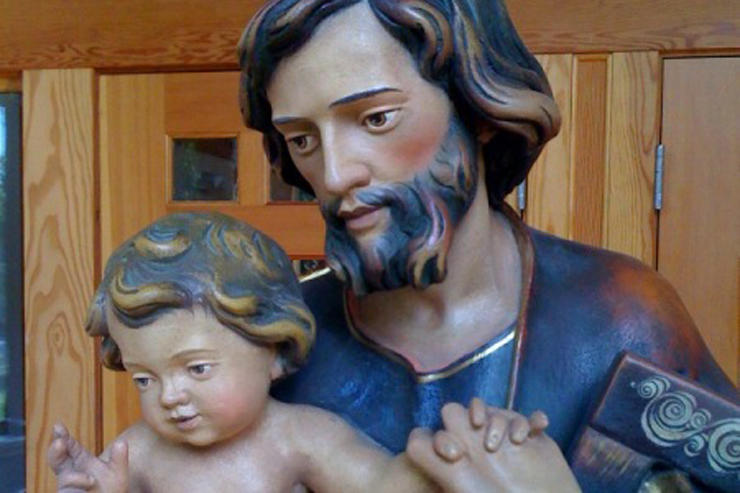I have had numerous conversations with friends and professional acquaintances over the years on the subject of openly sharing our Catholic faith. I am always a little surprised at how often many of them express strong reluctance to being open about their beliefs. The reasons given have included many you may have heard before.
“I don’t want to offend anyone.”
“We could never do that at work.”
“I don’t like to discuss that outside of my parish.”
Do we ever stop and reflect on how often our public actions and thinking are overly influenced by what others may think about our Catholic faith?
I wonder how many times a day we miss opportunities to stand up for Christ or share our faith. Is it the conversation we avoid with a troubled coworker? Is it standing up to someone who is attacking the Church? How about the person who is quietly curious about the Catholic faith and is only waiting on an invitation to attend Mass with us? Too often a misplaced concern for the opinions of those around us keeps us from embracing our responsibilities as Catholics. However, it is crystal clear that Jesus expects us to openly share our faith and be overt witnesses for Him when we read the Gospel of Matthew 10:32-33, “Everyone who acknowledges me before others I will acknowledge before my heavenly Father. But whoever denies me before others, I will deny before my heavenly Father.”
Christ always taught the Truth regardless of the audience, and is our greatest example on how to not be concerned about the respect of others. His enemies recognized this aspect of Christ’s teaching in Matthew 22:16: “Teacher, we know that you are a truthful man and that you teach the way of God in accordance with the truth. And you are not concerned with anyone’s opinion, for you do not regard a person’s status.”
Fr. Francis Fernandez, author of In Conversation with God, makes this relevant observation (about sharing the truth regardless of the repercussions): “Christ asks His disciples to imitate Him in this practice. Christians should foster and defend their well-earned professional, moral and social prestige, since it belongs to the essence of human dignity. This prestige is also an important component of our personal apostolate. Yet we should not forget that our conduct will meet with opposition from those who openly oppose Christian morality and those who practice a watered-down version of the Faith. It is possible that the Lord will ask of us the sacrifice of our good name, and even of life itself. With the help of His grace we will struggle to do His will. Everything we have belongs to the Lord.” (In Conversation with God, Vol. 4, pp. 267-268, Section 44.1)
I feel sorely challenged by the words in the preceding paragraph, yet I know we are all called to have courage and make sacrifices in His name. If we have faith and trust in Christ we will receive the grace we need. I also realize that our behavior will be a clear example to others of the strength of our faith. Many non-believers or lukewarm Christians may be moved to a deeper faith if they witness our good and sincere example.
Whether you are a business person, in career transition, a stay-at-home mom, a student or a senior citizen, chances are you have faced this struggle with worrying about what others think of us. It is a natural human tendency that affects me and everyone I know. We all want to be liked, respected and included. But, here’s the catch: we can’t separate our spiritual selves from our physical being. The faith we profess is part of who we are and can’t be hidden away. “This split between the faith which many profess and their daily lives deserves to be counted among the more serious errors of our age. The Christian who neglects his temporal duties, neglects his duties toward his neighbor and even God, and jeopardizes his eternal salvation.” (Gaudium et Spes, Second Vatican Council, 43)
Can we all agree that being “stealth” Catholics is not the answer? If so, here are six thoughts on how to overcome our fear of what others may think of us when publicly sharing our faith:
- Is there really a policy? I have heard many times that expressing our faith in the workplace is “against company policy.” Have we actually seen written policies that address making the Sign of the Cross and praying at meals, praying quietly at your desk, going to Mass at lunch or wearing ashes on our foreheads on Ash Wednesday? I know there may be exceptions, but let me challenge all of us to consider the possibility that much of our fear may be based on false perceptions of possible persecution and not reality.
- “Preach the Gospel at all times, use words if necessary.” Please reflect on these words of wisdom attributed to Saint Francis of Assisi. It rarely occurs to us to think about our own faith journeys, the example we set for others and the Christ-inspired joy we should radiate as the most effective ways to share our faith. Letting others see Jesus Christ at work in us is a powerful form of witness that will attract others who want what we have in our lives.
- We should share first. Why not be the one who breaks the ice by making reference to your family, challenges you are facing, vacation plans, a book you recently read, etc.? Start by sharing the easy things, encourage reciprocation by asking questions, then it’s easy to look for opportunities to share our faith. Pray that the Holy Spirit will provide opportunities for this sharing. If eating a meal with others, I have always found that saying a blessing and making the Sign of the Cross is an excellent catalyst for a conversation regarding faith. I have observed countless “guarded” conversations over the years in which individuals played it safe and politically correct. Let’s move beyond banal and safe dialogue and instead be courageous and transparent. If we truly love Christ and His Church, we need to let that love-inspired joy be known to all!
- Pursuing Heaven vs. being popular. Heaven is our ultimate destination. Will our critics help us get there? Will they stand up for us during tough times? No, they will pull us into a secular way of life that has little room for God and where materialism and popularity are the fashionable idols of the day. Fr. Francis Fernandez wrote that overcoming human respect is part of the virtue of fortitude. He describes the challenges a Christian may endure as “…rumors and calumnies, mockery, discrimination at work, the loss of economic opportunities or superficial friendships. In these uncomfortable circumstances it may be tempting to take the easy way out and ‘give in.’ By such means we could avoid rejection, misunderstanding and ridicule. We could become concerned at the thought of losing friends, of ‘closing doors’ which we will later be unable to re-open. This is the temptation to be influenced by human respect, hiding one’s true identity and forsaking our commitment to live as disciples of Christ.” (In Conversation with God, Volume 4, p. 269, section 44.2)
- Consistently pursue an integrated Catholic life. Do we take our faith with us to work, meals with friends, the kids’ soccer games and neighborhood swim meets? Or, do we only practice our Catholic faith at Mass on Sundays? It is easy to conform to secular expectations, but difficult to publicly show our love of Jesus, live out the Beatitudes, evangelize and lead a fully integrated life. I have always found inspiration on this topic in the wisdom of Pope St. John Paul II’s apostolic exhortation, Christifideles Laici: “The unity of life of the lay faithful is of the greatest importance: indeed they must be sanctified in everyday professional and social life. Therefore, to respond to their vocation, the lay faithful must see their daily activities as an occasion to join themselves to God, fulfill his will, serve other people and lead them to communion with God in Christ.”
- We can do more. “Really, most of us live below the level of our energy. And in order to be happy, we have to do more. Now, we can do more, spiritually and every other way. . . so you see how important it is to have in the mind to do all that you can. To work to the limit of your ability. Our world is really suffering from indifference. Indifference is apathy, not caring. I wonder maybe if our Lord does not suffer more from our indifference, than he did from the Crucifixion.” – Archbishop Fulton Sheen
We must pray for the guidance of the Holy Spirit, as we can’t do this alone. In my own experience, this is a daily work-in-progress, and it is never easy. We should recognize that there are others looking at our example who want to learn from us and be inspired by our courage, if we are only willing to take a stand for Christ. Think about how fortunate we are to live in a Christian country, despite the fact that our religious liberties are increasingly under attack. Fighting back and standing our ground in defense of our faith and religious freedom are part of our duty and our calling. In the early Church, to be openly Christian was to risk a martyr’s death. It is sobering to realize that Christians are being persecuted and murdered in the Middle East as you read this post. Are we prepared to be the martyrs of tomorrow and fight for our faith?
As difficult as it may sound, a sacrifice on our part is required. The sacrifice is simply to love Christ more than the court of public opinion. I hope we realize how little is being asked of us compared to what Jesus endured for us on the Cross. As I stated earlier, the desire to be liked, respected and popular is normal. I sometimes struggle with this, as do many of you. In spite of this, let’s pray for one another and continue to ask Jesus for courage, strength and the discernment to know and follow His Will and not be concerned about what others think of us.
Editor’s Note: Would you like to learn more about Randy Hain’s books? His seventh book, Special Children, Blessed Fathers: Encouragement for Fathers of Children with Special Needs (Foreword by Archbishop Charles J. Chaput), is available along with all of his books via Amazon.















